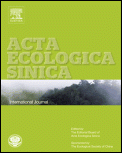
Acta Ecologica Sinica
Scope & Guideline
Cultivating insights in ecology and environmental stewardship.
Introduction
Aims and Scopes
- Ecosystem Health and Management:
Research addressing the health of ecosystems and the management strategies to maintain or restore ecological balance. This includes assessments of ecosystem services and the impact of human activities on environmental quality. - Biodiversity and Conservation Biology:
Studies focused on the diversity of species, their interactions, and the conservation of habitats and ecosystems. This area includes assessments of endangered species, habitat restoration, and the effects of invasive species. - Soil and Water Quality Assessment:
Research examining the quality of soil and water resources, including the impact of pollutants, agricultural practices, and land use changes on environmental health. - Plant and Microbial Interactions:
Investigations into the relationships between plants and microorganisms, including studies on plant health, soil health, and phytochemical properties. - Climate Change Impacts:
Research assessing the effects of climate change on various ecological parameters, including species distribution, ecosystem functions, and resilience strategies. - Traditional and Ethnobotanical Knowledge:
Studies that explore the use of traditional ecological knowledge and medicinal plants by local communities, emphasizing their role in biodiversity conservation.
Trending and Emerging
- Green Remediation Technologies:
There is a growing focus on green remediation methods, such as the use of bio-adsorbents and phytoremediation techniques, which offer sustainable solutions for pollution management. - Digital and Remote Sensing Approaches:
Emerging research utilizing digital tools and remote sensing technologies to monitor ecological changes and assess biodiversity, indicating a trend towards integrating technology in ecological research. - Climate Resilience and Adaptation Strategies:
Increasing attention is being paid to the development of climate resilience strategies within ecosystems, including studies on species adaptation and ecosystem services under climate stress. - Interdisciplinary Approaches to Ecological Research:
A trend towards interdisciplinary studies combining ecology, sociology, and economics, particularly in the context of community engagement and traditional ecological knowledge, is becoming more prominent. - Microbial Ecology and Plant Health:
Research focusing on the role of soil microbes in plant health and ecosystem functions is gaining traction, reflecting an increased interest in understanding soil microbiomes and their ecological importance.
Declining or Waning
- Heavy Metal Pollution Studies:
Research on heavy metal pollution has decreased, possibly due to a shift towards broader environmental assessments and the integration of pollution studies within larger ecological frameworks. - Agricultural Impact Assessments:
There is a noticeable decline in studies solely focused on the impacts of conventional agricultural practices on ecosystems, as more research shifts towards sustainable agricultural practices and agroecology. - Invasive Species Management:
Although still important, the volume of papers specifically addressing invasive species management has waned, likely due to a broader emphasis on holistic ecosystem management approaches that incorporate multiple ecological stressors.
Similar Journals
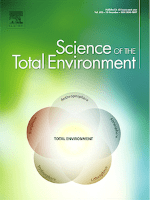
Science of The Total Environment
Transforming Environmental Challenges into OpportunitiesScience of The Total Environment, an esteemed journal published by Elsevier, holds a significant position in the field of environmental science, encompassing critical areas such as Environmental Chemistry, Environmental Engineering, Pollution, and Waste Management and Disposal. With an impressive impact factor and ranked in the Q1 quartile across its categories for 2023, the journal is recognized for its high-quality research output and contribution to environmental sustainability. Operating from its base in the Netherlands, the journal has been a valuable resource since its inception in 1972, welcoming innovative studies that address complex environmental challenges. Its notable rankings—such as Rank #9 in both Environmental Sciences and Pollution—underscore its relevance and influence in the academic community. Although the journal currently does not provide an open access option, the robust findings and discussions presented within its pages continue to foster a deeper understanding of environmental issues. Science of The Total Environment is an essential platform for researchers, professionals, and students dedicated to advancing knowledge and solutions in the rapidly evolving field of environmental science.

ACTA OECOLOGICA-INTERNATIONAL JOURNAL OF ECOLOGY
Pioneering Research for Ecological UnderstandingACTA OECOLOGICA-INTERNATIONAL JOURNAL OF ECOLOGY, published by Elsevier, stands as a prominent platform for disseminating innovative research in the diverse field of ecology. Operating since 1983 and continuing to make significant contributions into 2024, this journal features critical studies that advance our understanding of ecological systems, behaviors, and conservation efforts. With an impressive Q2 ranking in both the ecology and nature conservation categories, it exemplifies high-quality scholarship, reflected in its Scopus rankings—#74 in Environmental Science and #254 in Agricultural and Biological Sciences. Researchers, professionals, and students in the field are invited to explore the latest findings and methodologies that address pivotal ecological issues. As a journal committed to fostering academic collaboration, ACTA OECOLOGICA is essential for anyone dedicated to enhancing their comprehension of ecological dynamics and advancing sustainability practices globally.

Journal of Fish and Wildlife Management
Uncovering sustainable practices for ecological health.The Journal of Fish and Wildlife Management, published by the U.S. Fish & Wildlife Service, serves as a vital resource for scholars, researchers, and professionals in the fields of Animal Science, Ecology, and Conservation Biology. With its ISSN 1944-687X, this esteemed journal has been disseminating critical research findings since 2010, contributing significantly to the understanding of fish and wildlife conservation practices and their ecological impacts. Despite its Q3 category rankings in various disciplines as of 2023, it provides a platform for innovative research that influences policy and management strategies for biodiversity conservation. The journal, although not open access, remains committed to advancing the scientific discourse surrounding wildlife management with articles that emphasize practical conservation efforts and ecological sustainability. Readers can expect a diverse range of articles that promote best practices in the management and conservation of fish and wildlife resources, furthering our collective mission of preserving ecological health and biodiversity for future generations.
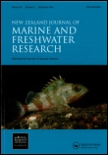
NEW ZEALAND JOURNAL OF MARINE AND FRESHWATER RESEARCH
Navigating the Future of Aquatic EcologyNEW ZEALAND JOURNAL OF MARINE AND FRESHWATER RESEARCH, published by Taylor & Francis Ltd, stands as a distinguished platform for the dissemination of innovative research in the realms of aquatic science and ecology. With an ISSN of 0028-8330 and E-ISSN 1175-8805, this journal has been curating significant scientific contributions since its inception in 1967, continuing through to 2024. Recognized in the Q2 category across multiple relevant fields—including Aquatic Science, Ecology, and Water Science—this journal ranks notably in Scopus, with a 74th percentile for Ecology, Evolution, Behavior and Systematics, highlighting its impact and relevance within the scientific community. Though not an open-access publication, its rigorous peer-reviewed articles offer insights that resonate with researchers, professionals, and students who are passionate about advancing our understanding of freshwater and marine ecosystems. By fostering a collaborative space for ecological and environmental inquiries, the NEW ZEALAND JOURNAL OF MARINE AND FRESHWATER RESEARCH is essential for those aiming to contribute to the vital conversations around biodiversity, conservation, and sustainable management of aquatic resources.
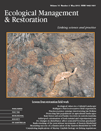
ECOLOGICAL MANAGEMENT & RESTORATION
Advancing ecological solutions for a sustainable tomorrow.Ecological Management & Restoration is a premier international journal published by Wiley, dedicated to advancing the fields of ecology, environmental management, conservation, and restoration practices. With an impact factor that positions it in the Q2 category across various ecological and management domains, this journal serves as a critical platform for researchers and professionals seeking to address contemporary issues related to ecosystem health, biodiversity, and sustainable management. Covering a wide range of topics from ecological restoration techniques to policy impacts on nature conservation, the journal caters to a diverse audience and contributes to the scientific community's understanding of environmental challenges. Importantly, the journal provides significant visibility, ranking in the top percentiles within key ecological research arenas such as Nature and Landscape Conservation, reinforcing its value for researchers aiming to influence both scientific thought and practical applications in ecology and management. The journal's commitment to disseminating high-quality research makes it an essential resource for students, researchers, and practitioners dedicated to fostering a sustainable future.

Folia Oecologica
Pioneering Research in Environmental Sciences.Folia Oecologica is a distinguished open-access journal published by WALTER DE GRUYTER GMBH, focusing on critical research in the fields of agricultural and biological sciences, ecology, and forestry. Established as a vital platform for the dissemination of knowledge, this journal has been providing free access to its valuable content since 2017, catering to an international audience engaged in environmental and ecological studies. With its ISSN 1336-5266 and E-ISSN 1338-7014, Folia Oecologica has earned notable ranks in Scopus, placing it in the 62nd percentile for Agricultural and Biological Sciences and the 50th percentile for Environmental Science. The journal's commitment to high-quality research is reflected in its positions in the Q2 and Q3 quartiles across various categories in 2023. As it converges years from 2006 to 2024, Folia Oecologica continues to foster scholarly dialogue and collaboration among researchers, professionals, and students, making significant contributions to the understanding and preservation of our ecological systems.

Global Ecology and Conservation
Leading the way in ecology and conservation science.Global Ecology and Conservation, published by Elsevier, stands as a premier open-access journal dedicated to advancing the field of ecology and conservation science. Since its inception in 2014, the journal has facilitated the dissemination of high-quality research, fostering critical dialogue on ecosystem management, biodiversity preservation, and sustainability practices across the globe. With a remarkable ranking within the top quartiles (Q1) in various categories including Ecology, Evolution, Behavior and Systematics, and Nature and Landscape Conservation, it is positioned among the leading resources for researchers and professionals alike. The journal has garnered a notable impact, ranking #65 out of 721 in Ecology, and houses articles that are vital to understanding and addressing the pressing environmental challenges of our time. Available in an open-access format, researchers can freely access and share vital findings, promoting a collaborative approach to ecological research. Global Ecology and Conservation is not just a publication; it is a critical tool for innovation and advocacy in conservation, poised to inspire the next generation of environmental stewards.

WETLANDS ECOLOGY AND MANAGEMENT
Navigating the complexities of wetland ecosystems for better management.Wetlands Ecology and Management, published by Springer, is an esteemed journal that has been advancing the field of wetland studies since its inception in 1982. Operating under the ISSN 0923-4861 and E-ISSN 1572-9834, this journal is headquartered in the Netherlands and serves as a critical resource for researchers, professionals, and students alike. It fosters interdisciplinary dialogue among aquatic science, ecology, and resource management disciplines, ranking in the Q2 category for Aquatic Science and Ecology, Evolution, Behavior and Systematics as of 2023. With a notable Scopus ranking, it is positioned favorably within the 65th percentile in Ecology and a commendable 58th percentile in Aquatic Sciences. The journal emphasizes the importance of effective management strategies and policies in the conservation of wetlands, making it indispensable for those aiming to drive impactful research. Although it is not an open-access journal, its high-quality publications remain accessible through library consortia and institutional subscriptions, ensuring that pertinent insights into the ecological dynamics and sustainable management practices are available to the global research community.
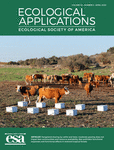
ECOLOGICAL APPLICATIONS
Pioneering research for the preservation of our planet.ECOLOGICAL APPLICATIONS, published by WILEY, is a leading journal in the field of ecology, providing a platform for innovative research that addresses the understanding and management of ecological systems. With an ISSN of 1051-0761 and E-ISSN of 1939-5582, it has established itself as a vital resource for ecologists and environmental scientists since its inception in 1991. Ranked in the top quartile (Q1) for Ecology in 2023 and with a Scopus ranking of 40 out of 461 in Environmental Science, ECOLOGICAL APPLICATIONS boasts an impressive impact factor, attesting to its significance and influence in the field. The journal's mission is to publish peer-reviewed articles that contribute to ecological theory and its applications in conservation and environmental management. Researchers, professionals, and students alike will find invaluable insights and the latest developments in ecological research through its comprehensive scope and rigorous scholarship, ensuring a crucial role in shaping future ecological practices and policies.
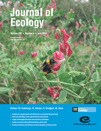
JOURNAL OF ECOLOGY
Connecting researchers through impactful ecological studies.JOURNAL OF ECOLOGY, published by Wiley, stands as a leading publication in the field of ecology, evolution, behavior, and plant science, currently positioned in the prestigious Q1 quartile across these categories. Established in 1976, the journal has consistently provided a platform for innovative research and critical discourse related to ecological patterns, processes, and interactions. With its robust Scopus ranking—31st out of 721 in Ecology, Evolution, Behavior and Systematics, and 26th out of 516 in Plant Science—this journal notably reflects the high impact and influence of its articles in the scientific community. Although it does not offer open access options, the journal ensures comprehensive dissemination of pivotal findings to researchers, professionals, and students alike. Located in the United Kingdom at 111 River St, Hoboken, NJ, the JOURNAL OF ECOLOGY remains an essential resource for those dedicated to advancing our understanding of ecological systems and their complexities.